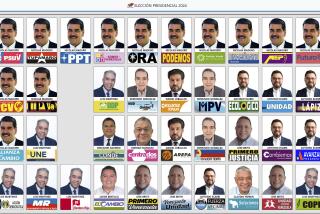Mitterrand Confident on Election Eve
- Share via
PARIS — An aggressive and good-humored President Francois Mitterrand, obviously in a confident mood, is the overwhelming favorite to lead a field of nine candidates today in the first round of the French presidential election.
Premier Jacques Chirac, a right-wing Gaullist candidate, is expected to take second place easily and thus win the right to face Mitterrand in a runoff for the presidency May 8.
Under French law, the two top candidates meet in a second and final round if no one receives more than 50% of the votes in the first round. No one, not even the late Gen. Charles de Gaulle, has won in the first round since popular elections of presidents began in 1965.
A number of potential campaign issues--the possible release of French hostages in Beirut, the slaying of three French police officers by separatists in New Caledonia, a debate over a television debate--surfaced on the eve of the first round of voting, but none was expected to influence in any significant way the choices of the more than 38 million eligible voters in today’s balloting. The issues, however, could take on importance during the next two weeks of the runoff campaign.
No polls are allowed to be published in France during the week of an election. In the last poll published by the Paris newspaper Liberation a week ago, the 71-year-old Mitterrand, a Socialist, received 38% of the sample polled, followed by the 55-year-old Chirac, candidate of the Rally for the Republic party, with 23.5% and the 64-year-old Raymond Barre, a former premier and candidate of the center-right Union for the French Democracy, with 19%.
A few months ago, Barre was a heavy favorite to join Mitterrand in the runoff, but his lackluster campaign faltered and fizzled in the last few weeks.
Barre, unaggressive, professorial and often boring, never tried hard to explain to conservative voters why they should vote for him rather than Chirac.
Le Pen Running Third
The main candidates, according to the poll, were followed by extreme rightist Jean-Marie Le Pen with 9.5%, Communist Party candidate Andre Lajoinie with 5%, Pierre Juquin, a breakaway Communist, with 2.5%, environmentalist Antoine Waechter with 2% and Trotskyite Arlette Laguiller with 0.5%. Extreme leftist Pierre Boussel polled nothing.
Although the total number of rightist votes outnumbered leftist votes, the poll also showed that enough Barre and Le Pen voters would scorn Chirac to ensure a Mitterrand victory in the runoff by 54% to 46%.
Mitterrand brimmed with confidence Friday night when he closed his first-round campaign with a rally attended by 30,000 cheering supporters at Le Bourget Airport outside Paris. He abandoned his usual elevated and literary presidential style to ridicule and mimic Chirac with slashing wit and flair.
Speaking for two hours in informal tones, Mitterrand, joking much of the time, accused Chirac of continually coming up with new conditions for a televised debate between the two during the second round. Noting that Chirac had refused a debate in which reporters ask questions (known in France as an American-style debate), preferring a debate in which the two candidates confront each other alone (known here as a French-style debate), Mitterrand said: “I say yes to a French-style debate or an American-style debate or a Japanese-style debate or a Chinese-style debate. Hey, so long as it’s clean.”
Campaign attention shifted to the French territory of New Caledonia on Friday when a group of Melanesian extremists killed three French gendarmes, wounded about 20 people and captured 27 in a raid on a police post. On Saturday, police said suspected extremists fired at least six gunshots into a carload of Europeans in the town of Canala, wounding three people.
Calls for End to Violence
Mitterrand, who has long criticized the Chirac government for failing to understand the resentful mood of the Melanesians, called for an end to the violence. “One cannot liberate oneself by oppressing others,” he said. But Chirac accused the Socialists of encouraging the separatists--an attitude, he said, “that cannot fail to have consequences of this kind.”
It has been an open secret in Paris for some time that the Chirac government has been working hard to strike a deal that would gain the release of three French hostages held by pro-Iranian Shia Muslims in Lebanon.
Freedom for the hostages might, in the view of some analysts, enhance Chirac’s chances for the presidency. On the other hand, a deal could backfire if voters felt that Chirac’s lieutenants, in their dealings with the Iranian government and the kidnapers, paid a humiliating price for freedom.
More to Read
Sign up for Essential California
The most important California stories and recommendations in your inbox every morning.
You may occasionally receive promotional content from the Los Angeles Times.










